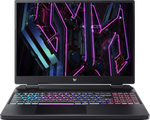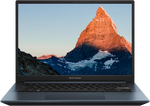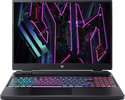A comparison of specs, key information, reviews, and best pricing from top retailers
Last updated -- hours ago | Report incorrect information
What we think

The PerfectRec laptop team Learn more
Updated January 12, 2024·
If you prioritize high performance for tasks like gaming, 3D rendering, or intensive engineering software, the Acer Predator Helios Neo 16, with its advanced processor and dedicated graphics card, is well-equipped to handle demanding applications, but it's heavier and has a shorter battery life. Conversely, the ASUS Vivobook Pro 14 offers a more lightweight and portable option with an impressive OLED display and better battery life, suitable for everyday use and on-the-go tasks, but less so for resource-intensive activities due to less powerful internals and integrated graphics, while being more budget-friendly. The tradeoff here is between raw power and portability with considerations for cost. Give Feedback
this description is based on the product variant with some specs and product variant with some specs. At the time of writing, the variant with some specs cost some dollars and the variant with some specs cost some dollars.
Advantages of the Acer Predator Helios Neo 16
- Very good for engineering and design
- Good for gaming and AI
Advantages of the ASUS Vivobook Pro 14
- Very good overall display quality
- Very good portability
- Good battery life
Key differences
General Use
7.6


7.0
1920 x 1200
RESOLUTION
2880 x 1800
IPS
DISPLAY TECHNOLOGY
OLED
373.0 nits
DISPLAY BRIGHTNESS
385.0 nits
5.0 Hours
BATTERY LIFE
8.0 Hours
7.5/10
KEYBOARD QUALITY SCORE
7.0/10
6.1/10
PORTABILITY SCORE
8.2/10
The Acer Predator Helios Neo 16 and ASUS Vivobook Pro 14 are both good for general use, though the Acer Predator Helios Neo 16 is somewhat better.
The Acer Predator Helios Neo 16 is better suited for general use due to its more powerful CPU, twice the amount of RAM, and dedicated graphics card, which contribute to better overall performance, but it's less portable and has a shorter battery life compared to the ASUS Vivobook Pro 14, which offers an OLED screen with higher resolution and color accuracy, making it excellent for media consumption, in addition to being lighter with longer battery life, although it falls short performance-wise due to lower RAM and an integrated graphics solution.
Gaming and AI
7.5


6.1
8.0/10
OVERALL GPU SCORE
3.7/10
1920 x 1200
RESOLUTION
2880 x 1800
165Hz
REFRESH RATE
90Hz
Yes
SUPPORTS DLSS
No
Yes
MUX SWITCH / ADVANCED OPTIMUS
No
7.5/10
FAN NOISE SCORE
7.0/10
The Acer Predator Helios Neo 16 is good for gaming and AI, while the ASUS Vivobook Pro 14 is only fair.
The Acer Predator Helios Neo 16 is better equipped for gaming and 3D due to its stronger Nvidia RTX 4050 graphics card and higher 165Hz screen refresh rate, which provide smoother visuals and can handle more demanding graphics. In contrast, the ASUS Vivobook Pro 14 sports a less powerful Intel Iris Xe GPU and a lower 90Hz refresh rate, trading off some gaming performance for potentially better portability and battery life.
Engineering and Design
8.3


7.0
9.2/10
OVERALL CPU SCORE
5.0/10
8.0/10
OVERALL GPU SCORE
3.7/10
16.0 GB
RAM
8.0 GB
The Acer Predator Helios Neo 16 is very good for engineering and design, while the ASUS Vivobook Pro 14 is good.
The Acer Predator Helios Neo 16 boasts stronger computing power ideal for demanding engineering software, thanks to its higher-end CPU, more RAM, and superior dedicated graphics card, along with a high-refresh-rate IPS screen, making it very good for engineering and design use. The ASUS Vivobook Pro 14, though portable with a high-resolution OLED screen, has less powerful integrated graphics and a less robust CPU, which still performs well for engineering tasks but can't match the Acer's higher performance components.
Screen Quality
7.8


8.4
16.0in
SIZE
14.0in
1920 x 1200
RESOLUTION
2880 x 1800
IPS
DISPLAY TECHNOLOGY
OLED
165Hz
REFRESH RATE
90Hz
373.0 nits
BRIGHTNESS
385.0 nits
The Acer Predator Helios Neo 16 has a better screen than the ASUS Vivobook Pro 14 for gaming and AI, software development, and content creation, while the ASUS Vivobook Pro 14 has a better screen for general use, and engineering and design.
The Acer Predator Helios Neo 16 offers satisfactory clarity, resolution, and brightness for everyday tasks and engineering applications but may fall short for fast-paced 3D games due to its lower refresh rate. The ASUS Vivobook Pro 14 excels in delivering crisp images and vibrant colors for both general computing and detailed design work, benefiting from its excellent color coverage, but like the Acer, it isn't ideal for gaming because of a refresh rate that can't keep up with the demands of high-speed gaming visuals. Both laptops are well-suited for productivity and professional work, but gamers should consider options with higher refresh rates for smoother gameplay.
Battery
5.0 Hours


8.0 Hours
The Acer Predator Helios Neo 16 has 5 hours of battery life. The ASUS Vivobook Pro 14 has 8 hours of battery life.
Battery life estimate is based on a mix of common use patterns. More portable and higher performing laptops tend to have less battery life.
Portability
Fair


Very Good
16.0in
SIZE
14.0in
5.7 lbs
WEIGHT
3.0 lbs
1.1in
THICKNESS
0.7in
The ASUS Vivobook Pro 14 has very good portability, while the Acer Predator Helios Neo 16 has only fair portability.
The most portable laptops are small, thin, and light.
Cost
$799


$548
$200
$400
$600
$800
$1,000
$1,200
The Acer Predator Helios Neo 16 has a price of $799 and the ASUS Vivobook Pro 14 costs $548.

Let Us Help Find Your Perfect Laptop
Find your new laptop
Key similarities
Content Creation
7.7


7.3
9.2/10
OVERALL CPU SCORE
5.0/10
1920 x 1200
RESOLUTION
2880 x 1800
16.0 GB
RAM
8.0 GB
IPS
DISPLAY TECHNOLOGY
OLED
The Acer Predator Helios Neo 16 and ASUS Vivobook Pro 14 are both good for content creation.
PerfectRec’s Content Creation Score takes into account the many different features of the laptop that make it more or less suitable for photo editing, video editing and other content creation tasks.
Software Development
7.5


7.2
9.2/10
OVERALL CPU SCORE
5.0/10
16.0 GB
RAM
8.0 GB
1920 x 1200
RESOLUTION
2880 x 1800
7.5/10
KEYBOARD QUALITY SCORE
7.0/10
The Acer Predator Helios Neo 16 and ASUS Vivobook Pro 14 are both good for software development.
PerfectRec’s Software Development Score takes into account the many different features of the laptop that make it more or less suitable for software developers.
Build Quality
7.4


7.4
The Acer Predator Helios Neo 16 and ASUS Vivobook Pro 14 both have good build quality.
PerfectRec’s Build Quality Score incorporates case materials, display and keyboard flex, hinge quality, and overall reliability.
Give feedback
We’re constantly working to improve.
How the Acer Predator Helios Neo 16 and the ASUS Vivobook Pro 14 compare to other laptops
Spec Comparison
| Acer Predator Helios Neo 16 | ASUS Vivobook Pro 14 |
GENERAL | |||
|---|---|---|---|
| Price | |||
$799 | $548 | ||
Release Date | |||
Release Date | April 1, 2023 | June 1, 2022 | |
Overall Dimensions | |||
Overall Dimensions | 14.2'' x 11'' x 1.11'' | 12.5'' x 9'' x 0.76'' | |
Weight | |||
Weight | 5.73 lbs | 3.09 lbs | |
Width | |||
Width | 14.2" | 12.5" | |
Depth | |||
Depth | 11" | 9" | |
INTERNAL | |||
|---|---|---|---|
Processor | |||
Processor | Intel i5-13500HX | Intel i5-11300H | |
RAM | |||
RAM | 16 GB | 8 GB | |
DDR Memory Version | |||
DDR Memory Version | 5 | 4 | |
RAM Slots | |||
RAM Slots | 2 | 0 | |
Storage | |||
Storage | 512 GB | 256 GB | |
BATTERY | |||
|---|---|---|---|
Battery Life | |||
Battery Life | 5 Hours | 8 Hours | |
Battery Capacity | |||
Battery Capacity | 90 Wh | 63 Wh | |
SCREEN | |||
|---|---|---|---|
Diagonal Size | |||
Diagonal Size | 16" | 14" | |
Display Technology | |||
Display Technology | IPS | OLED | |
Resolution | |||
Resolution | 1920 x 1200 | 2880 x 1800 | |
Refresh Rate | |||
Refresh Rate | 165Hz | 90Hz | |
Display Brightness | |||
Display Brightness | 373 nits | 385 nits | |
RELIABILITY, APPEARANCE & ACOUSTICS | |||
|---|---|---|---|
Build Quality Score | |||
Build Quality Score | 7.4/10 | 7.4/10 | |
Portability Score | |||
Portability Score | 6.2/10 | 8.3/10 | |
Gaming Laptop Appearance | |||
Gaming Laptop Appearance | Yes | No | |
Premium Business Laptop | |||
Premium Business Laptop | No | No | |
Fan Noise Score | |||
Fan Noise Score | 7.5/10 | 7/10 | |
HARDWARE FEATURES | |||
|---|---|---|---|
Keyboard Quality Score | |||
Keyboard Quality Score | 7.5/10 | 7/10 | |
Speaker Quality Score | |||
Speaker Quality Score | 7/10 | 7/10 | |
Webcam | |||
Webcam | 1080p | 720p | |
Fingerprint Reader | |||
Fingerprint Reader | No | Yes | |
Backlit Keyboard | |||
Backlit Keyboard | Yes | Yes | |
Number Pad | |||
Number Pad | Yes | No | |
CONNECTIVITY | |||
|---|---|---|---|
USB Type-A | |||
USB Type-A | 3 | 3 | |
USB-C ports | |||
USB-C ports | 2 | 1 | |
USB-C Charging | |||
USB-C Charging | Yes | Yes | |
Display Outputs | |||
Display Outputs | 3 | 2 | |
Thunderbolt Version | |||
Thunderbolt Version | 4 | 4 | |
Shopping
Acer Predator Helios Neo 16
See more
Dig into reviews and images
PCMag
Mark Knapp | August 2023
"The Acer Predator Helios Neo 16 sacrifices portability and a truly budget price in the name of additional power. While remaining relatively budget-friendly, this gaming laptop packs serious processing chops, and Acer optimizes its internals to deliver respectable 1080p (or 1200p) gameplay from an RTX 4050. Its keyboard and chassis design won't win it any awards, but its display is a cut above for the price."
ASUS Vivobook Pro 14
See more
Dig into reviews and images
NotebookCheck
Marc Herter | July 2022
"The Asus Vivobook Pro 14 OLED is a Pantone Validated laptop that packs a lot of processing power. The Asus VivoBook Pro 14 OLED's highlight is its outstanding display: Featuring a 3K resolution in the 16:10 format and nearly a 100% coverage of the Display P3 color space, the display hardly leaves anything to be desired. The Asus laptop also shows impeccable rates in terms of general system performance. Combined with long battery life, low noise emissions, and relatively good speakers, the laptop can be recommended to users who can accept compromises in terms of connectivity."
Get a great deal on the Acer Predator Helios Neo 16 or the ASUS Vivobook Pro 14
About Acer
Acer is a prominent Taiwanese electronics brand which makes a wide range of laptops, with multiple product lines catering to personal use, gaming, and business use. They are renowned for having exceptional value for money, as they frequently offer good specifications at a lower price than other manufacturers.
About ASUS
ASUS, a Taiwanese electronics brand, is one of the largest personal computer vendor by market share. The majority of their laptops are targeted towards personal use or gaming. Their most popular product lines include the budget-friendly VivoBook, more premium ZenBook, and their TUF and ROG gaming laptops, the latter of which has a reputation for excellent gaming performance.
Give feedback
We're constantly perfecting our model
Laptop guides you might be interested in
More comparisons for you
Compare Acer Predator Helios Neo 16 vs. Lenovo IdeaPad Slim 7i Pro VS
VS


Compare Acer Predator Helios Neo 16 vs. Dell Inspiron 16 5625 VS
VS


Compare Acer Predator Helios Neo 16 vs. Acer Aspire 5 15 VS
VS


Compare ASUS Vivobook Pro 14 vs. Lenovo IdeaPad Gaming 3 VS
VS


Compare ASUS Vivobook Pro 14 vs. ASUS Vivobook 17 VS
VS


Compare ASUS Vivobook Pro 14 vs. Acer Swift 3 VS
VS


FAQs
FAQs about laptops
Why trust us
This information was produced and vetted by the PerfectRec laptops team. We are a product research and recommendation organization that meticulously reviews and evaluates the latest laptop information and makes it digestible for you.
By the numbers
380
Laptops evaluated
48,640
Laptops stats compiled
13
Proprietary Laptops ratings developed
150,195
Recommendations made
32,543
Consumer hours saved
About the laptop team
Joe Golden, Ph.D
CEO and Laptops Editor
Joe is an entrepreneur and lifelong electronics enthusiast with a Ph.D in Economics from the University of Michigan.
Jason Lew
Staff Expert & Software Engineer
Jason is a staff expert and software engineer that has been making laptop recommendations for 7 years and moderates one of the largest laptop subreddits.
Chandradeep Chowdhury
Staff Expert & Software Engineer
Chandradeep is a staff expert and software engineer and expert in televisions and monitors. He’s been making monitor recommendations for ten years.
Craig Russell
Laptops Expert
Craig is a UK-based laptops expert. Craig works in IT, where he recommends and supports laptops and PCs for clients and has been recommending laptops on Reddit for five years.







